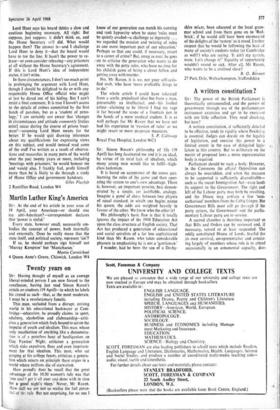Sir : Simon Raven's philosophy of life (19 April') has
long fascinated me and it is an ideal, by virtue of its total lack of idealism, which many young men would like to fulfil—high- clasi hedonism.
It is based on acceptance of the status quo, learning the rules of the game and then oper- ating the system to one's own advantage. There is, however, an important proviso, best demon- strated by a simple, yet justifiable, analogy. Imagine a garr4 of chess between two players of equal standard, in which one begins minus his queen; the odds are weighted heavily in favour of the other. We know who the other is, His philosophy's basic flaw is that it totally ignores the impact of the 1944 Education Act upon the class structure of English society. That Act has produced a generation of educational and social spiralists of a far less sophisticated kind than Mr Raven, who takes considerable pleasure in emphasising he is not a 'gentleman.'
I wonder, had he been the son of a Derby-
shire mixer, been educated at the local gram- mar school and from there gone on to 'Red- brick', if he would still have been enamoured of the delights of the 'system' as it stood. I rather suspect that he would be following the lead of many of society's students today (at Cambridge as well!) who are saying, it ain't my system, mate. Let's change it!' Equality of opportunity wouldn't sound so sick. After all, Mr Raven, who wants to be a civilised slave?






































 Previous page
Previous page